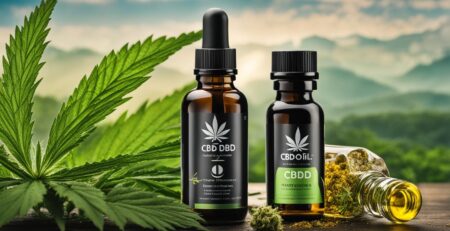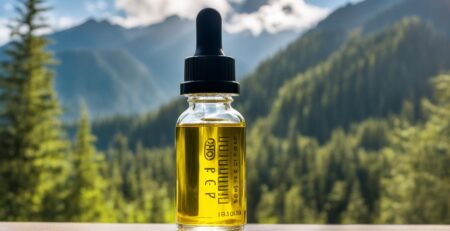Grasping the Timeline: Understanding the Timeframe for CBD Oil’s Effectiveness
CBD oil has gained significant attention for its potential in managing anxiety symptoms, but many people are curious about how long it takes for CBD oil to work. In this article, we will delve into the various factors that influence the effectiveness of CBD oil and explore the timeline for its impact.
Key Takeaways:
- Understanding the timeframe for CBD oil's effectiveness can help manage expectations.
- The duration of CBD oil's effectiveness varies among individuals.
- Factors such as dosage, CBD concentration, method of consumption, and consistency of use can influence the effectiveness.
- Personal experiences with CBD oil may vary, so it's important to find what works best for you.
- Consistency in CBD oil usage is key for optimal results.
Understanding CBD Oil
CBD oil is derived from the cannabis plant, specifically the hemp variety, which is high in CBD and low in THC. It is extracted from the plant using methods like CO2 extraction, which ensures the purity and quality of the oil. CBD oil comes in different forms, including full-spectrum, broad-spectrum, and CBD isolate. The legal status of CBD oil varies, but it is generally well-tolerated and safe to use.
Full-spectrum CBD oil contains all the naturally occurring compounds found in the hemp plant, including cannabinoids, terpenes, and trace amounts of THC. Broad-spectrum CBD oil goes through additional processing to remove THC, while CBD isolate is a pure form of CBD with no other compounds.
When it comes to choosing a CBD oil product, it's important to consider your individual needs and preferences. Full-spectrum CBD oil is believed to have an “entourage effect,” where the various compounds work together synergistically to enhance the overall benefits. However, if you are concerned about THC content or have a sensitivity to it, opt for a broad-spectrum or CBD isolate product.
Types of CBD Oil:
- Full-spectrum CBD oil: Contains all the naturally occurring compounds found in the hemp plant, including cannabinoids, terpenes, and trace amounts of THC.
- Broad-spectrum CBD oil: Goes through additional processing to remove THC, while retaining other beneficial compounds.
- CBD isolate: A pure form of CBD with no other compounds.
It's important to note that CBD oil is not a miracle cure-all and may not work the same way for everyone. Factors such as individual body chemistry, dosage, and consistency of use can influence its effectiveness. It's always recommended to consult with a healthcare professional before starting any new supplement regimen, especially if you have underlying health conditions or are taking medication.
| Factors Influencing CBD Oil Effectiveness | Key Considerations |
|---|---|
| Dosage | Finding the right dosage is crucial for optimal results. Start with a low dose and gradually increase as needed. |
| Individual Body Chemistry | Each person may respond differently to CBD oil due to variations in body chemistry. What works for one person may not work for another. |
| Consistency of Use | Using CBD oil consistently and regularly is important to see its full benefits. Stick to a routine and give it time to work. |
| Method of Consumption | The way you consume CBD oil can affect its onset time and effectiveness. Consider options like sublingual administration, ingestion, topical application, or smoking/vaping. |
| Interactions with Medications | CBD oil can interact with certain medications, so it's important to consult with a healthcare professional if you're taking any prescription drugs. |
Understanding CBD oil and its various forms, as well as considering the factors that can influence its effectiveness, can help individuals make informed decisions about incorporating it into their wellness routine. It's important to remember that CBD oil should not replace any prescribed medications, and results may vary from person to person. Finding the right product, dosage, and consistency is key to maximizing its potential benefits.
Understanding Anxiety Symptoms
Anxiety is a complex condition that can significantly impact daily life and overall well-being. It manifests in various forms, including Generalized Anxiety Disorder (GAD) and Social Anxiety Disorder. People with GAD may experience excessive worry and fear about everyday situations, while those with social anxiety may feel intense distress in social settings. Common symptoms of anxiety include:
- Racing thoughts
- Restlessness or irritability
- Difficulty concentrating
- Physical symptoms such as rapid heartbeat, shortness of breath, and sweaty palms
- Sleep disturbances
- Panic attacks
Anxiety can be debilitating and interfere with daily activities, relationships, and overall quality of life. It is important to recognize and understand these symptoms to effectively manage anxiety.
By examining anxiety symptoms, we can better understand the potential benefits of CBD oil in relieving them. Studies and anecdotal evidence suggest that CBD oil may have a positive impact on anxiety symptoms, offering a potential alternative to traditional treatments. However, it is essential to approach CBD oil as a complementary therapy and consult with a healthcare professional for personalized advice.
| Anxiety Symptoms | Common Signs |
|---|---|
| Racing thoughts | Difficulty controlling or stopping persistent thoughts |
| Restlessness or irritability | Feeling on edge, unable to relax |
| Difficulty concentrating | Trouble focusing on tasks or remembering information |
| Physical symptoms | Rapid heartbeat, shortness of breath, sweating |
| Sleep disturbances | Trouble falling asleep, staying asleep, or having restless sleep |
| Panic attacks | Sudden and intense episodes of fear or apprehension |
Understanding anxiety symptoms and their impact is crucial for finding effective solutions. While CBD oil shows promise in managing anxiety, it is essential to approach it as part of a comprehensive treatment plan. Consulting with healthcare professionals can help individuals determine the best course of action.
How CBD Oil May Help with Anxiety
CBD oil has gained attention for its potential in managing anxiety symptoms. But how does it actually work? Research suggests that CBD interacts with the endocannabinoid system in the body, which regulates various bodily processes, including mood and sleep. By altering serotonin signals in the brain, CBD oil may help reduce anxiety and induce a calming effect.
Several studies have shown promising results in using CBD oil for anxiety. A 2019 study published in the Journal of Clinical Psychology found that CBD oil reduced anxiety symptoms in 79% of participants. Another study published in the Permanente Journal in 2019 observed a significant reduction in anxiety scores among participants who used CBD oil.
However, it's important to note that individual experiences may vary. CBD oil is not a one-size-fits-all solution, and further research is needed to fully understand its effectiveness in managing anxiety. It is always recommended to consult with a healthcare professional before starting any new treatment or supplement regimen.
Table: Studies on CBD Oil and Anxiety
| Study | Participants | Results |
|---|---|---|
| Journal of Clinical Psychology (2019) | 37 individuals with anxiety | 79% reported reduced anxiety symptoms |
| Permanente Journal (2019) | 72 individuals with anxiety and poor sleep | Significant reduction in anxiety scores |
While CBD oil shows promise in managing anxiety, it is not a standalone treatment. It is important to incorporate CBD oil as part of a holistic approach to anxiety management, which may include therapy, lifestyle changes, and other treatments recommended by a healthcare professional.
Factors Influencing the Effectiveness of CBD Oil
When it comes to the effectiveness of CBD oil, several factors come into play. Understanding these factors can help users make informed decisions about dosage, timing, and consumption methods to maximize the benefits of CBD oil for managing anxiety symptoms. Here are the key factors that influence the effectiveness of CBD oil:
- Dosage and CBD Concentration: Finding the right dosage and CBD concentration is crucial. It is recommended to start with a low dose and gradually increase until the desired effects are achieved. High-quality CBD oils provide clear information on CBD concentration per serving, assisting users in making precise dosing decisions.
- Individual Body Chemistry: Each individual has a unique body chemistry that may affect how quickly CBD oil takes effect and its overall effectiveness. Factors such as metabolism, weight, and overall health can influence the response to CBD oil.
- Method of Consumption: The method of consuming CBD oil can impact the onset time and effectiveness. Sublingual administration, where the oil is placed under the tongue, allows for faster absorption into the bloodstream. Ingestion, on the other hand, takes longer to take effect but provides longer-lasting effects.
- Consistency of Use: Consistency is key when it comes to using CBD oil. Regular and consistent use allows the body to react consistently to the supplement and fully experience its benefits. It is recommended to establish a consistent CBD oil routine and stick to it.
- Interactions with Other Medications: CBD oil may interact with certain medications, potentially affecting its effectiveness. It is important to consult with a healthcare professional before using CBD oil, especially if taking other medications, to ensure there are no adverse interactions.
By considering these factors and finding the right balance, individuals can optimize the effectiveness of CBD oil in managing anxiety symptoms. However, it is important to note that CBD affects everyone differently, and individual experiences may vary. It is always recommended to consult with a healthcare professional for personalized advice and guidance.
Table: Factors Influencing the Effectiveness of CBD Oil
| Factors | Description |
|---|---|
| Dosage and CBD Concentration | Finding the right dosage and CBD concentration is crucial. Start with a low dose and gradually increase until desired effects are achieved. |
| Individual Body Chemistry | Each individual's unique body chemistry can influence how quickly CBD oil takes effect and its overall effectiveness. |
| Method of Consumption | The method of consuming CBD oil can impact the onset time and effectiveness. Sublingual administration provides faster absorption, while ingestion provides longer-lasting effects. |
| Consistency of Use | Regular and consistent use allows the body to react consistently and fully experience the benefits of CBD oil. |
| Interactions with Other Medications | CBD oil may interact with certain medications. Consult with a healthcare professional if taking other medications. |
Personal Experiences and Testimonials
When it comes to CBD oil, personal experiences and testimonials play a crucial role in understanding its effectiveness in managing anxiety symptoms. Many users have reported positive results and significant improvements in their overall well-being. It's important to note, however, that individual experiences may vary, and what works for one person may not work for another.
“CBD oil has been a game-changer for me. I've struggled with anxiety for years, and since incorporating CBD oil into my daily routine, I've noticed a significant reduction in my symptoms. I feel calmer, more relaxed, and able to navigate challenging situations with greater ease.” – Emily
Emily's experience is just one example of the many individuals who have found relief through CBD oil. The calming and soothing effects of CBD oil have been praised by users looking for a natural alternative to traditional anxiety treatments.
While personal experiences and testimonials are valuable, it's important to approach them with an open mind and understand that they are subjective accounts. Each person's body chemistry and response to CBD oil can vary, which is why it's essential to consult with a healthcare professional and find a personalized approach that works best for you.
Overall, personal experiences and testimonials offer valuable insights into the potential benefits of CBD oil in managing anxiety symptoms. They serve as anecdotal evidence and can help guide individuals in determining whether CBD oil may be a suitable addition to their wellness routine. However, it's crucial to remember that everyone is unique, and individual results may vary.
Determining the Best Time to Take CBD Oil
When it comes to optimizing the benefits of CBD oil, finding the best time to take it can make a significant difference. While there is no one-size-fits-all answer, understanding your preferences and goals can guide you in determining the optimal timing for your CBD oil intake.
Some individuals prefer taking CBD oil in the morning to start their day with a boost of energy and focus. This can help promote a sense of calm throughout the day and support overall well-being. On the other hand, taking CBD oil in the evening can be beneficial for relaxation and aiding a restful night's sleep. It can help ease the mind, reduce anxiety, and promote a sense of tranquility.
Experimentation and consistency are key when deciding the best time to take CBD oil. It's important to listen to your body and observe how it responds to different intake times. Keep in mind that CBD oil affects individuals differently, and what works for one person may not work the same way for another. By staying consistent with your CBD oil routine and monitoring its effects, you can determine the timing that suits you best.
Benefits of Morning CBD Oil Intake
Taking CBD oil in the morning can have several benefits. The energizing effect of CBD oil can provide a sense of focus and mental clarity, helping you start your day with a positive mindset. It can also support your body's natural stress response, promoting a calm and balanced state for better productivity and overall well-being throughout the day.
Benefits of Evening CBD Oil Intake
For those seeking relaxation and improved sleep quality, taking CBD oil in the evening can be beneficial. CBD oil can help calm the mind and reduce anxiety, creating a sense of tranquility that aids in winding down before bed. It can also promote a deeper and more restful sleep, allowing you to wake up feeling refreshed and rejuvenated in the morning.
Ways of Taking CBD Oil
When it comes to taking CBD oil, there are several methods you can choose from. Each method offers different benefits and considerations, allowing you to find the one that suits your preferences and needs. Here are some common ways of taking CBD oil:
Sublingual Administration
This method involves placing a few drops of CBD oil under your tongue and holding it there for about 60 seconds before swallowing. Sublingual administration allows for quick absorption of CBD into the bloodstream through the mucous membranes, resulting in faster onset of effects compared to other methods. It is a popular choice for those seeking fast-acting relief from anxiety symptoms or pain.
Ingestion
Ingesting CBD oil is another common method, where you consume it orally in the form of capsules, edibles, or adding it to food and beverages. When you ingest CBD oil, it has to pass through the digestive system before being absorbed into the bloodstream, resulting in a slower onset of effects compared to sublingual administration. However, ingestion provides longer-lasting effects as CBD is gradually released into the body over time.
Topical Application
If you are looking for localized relief from pain or inflammation, topical application of CBD oil may be suitable. This method involves applying CBD-infused creams, lotions, or balms directly onto the skin. The CBD is absorbed through the skin and interacts with the nearby cannabinoid receptors, providing targeted relief. Topical application is ideal for addressing muscle soreness, joint pain, or skin conditions.
Smoking/Vaping
Smoking or vaping CBD oil involves inhaling the vaporized oil into the lungs. This method provides the quickest onset of effects as the CBD is rapidly absorbed into the bloodstream through the lung tissues. However, it may not be suitable for everyone, particularly those with respiratory issues or concerns about lung health. It's important to note that smoking or vaping CBD oil may have additional risks associated with the inhalation of vapor or smoke.
Ultimately, the choice of the method depends on your personal preferences, desired effects, and specific needs. It's recommended to start with a low dose and gradually increase as needed while closely monitoring how your body responds. Consulting with a healthcare professional can also provide guidance on selecting the most appropriate method and dosage for your individual circumstances.

Dosing and Frequency
When it comes to using CBD oil, finding the right dosage and frequency can be essential to achieving optimal results. The appropriate dose of CBD oil varies depending on factors such as body weight, metabolism, and the desired effects. It's always recommended to start with a lower dose and gradually increase it until the desired results are achieved.
It's important to note that the Food Standards Agency (FSA) in the United Kingdom recommends a limit of 70mg of CBD per day. This recommendation serves as a general guideline for safe CBD oil consumption. However, it's crucial to consult with a healthcare professional, especially if you are taking other medications, to ensure there are no potential interactions.
Consistency is key when it comes to dosing and frequency. It's advisable to establish a consistent CBD oil routine and stick to it to experience its full benefits. This means taking CBD oil regularly at the same time each day or as advised by your healthcare provider. By staying consistent with your dosing and frequency, you allow your body to react consistently to the supplement, which can lead to more reliable and predictable results.
Table: CBD Oil Dosing Recommendations
| Weight Range | Low Dose | Moderate Dose | High Dose |
|---|---|---|---|
| Under 25 lbs | 3-6mg | 6-12mg | 12-20mg |
| 25-50 lbs | 6-12mg | 12-18mg | 18-30mg |
| 50-75 lbs | 12-18mg | 18-24mg | 24-40mg |
| 75-100 lbs | 18-24mg | 24-36mg | 36-60mg |
| Over 100 lbs | 24-30mg | 30-60mg | 60-100mg |
Note: The dosing recommendations provided in this table are general guidelines and may vary depending on individual factors. It's essential to start with a lower dose and adjust accordingly based on personal experience and consultation with a healthcare professional.
Consistency Is Key
In order to experience the full benefits of CBD oil, consistency is key. Consistency refers to maintaining a regular and steady routine of CBD oil usage. By incorporating CBD oil into your daily regimen, you allow your body to react consistently to the supplement, enhancing its effectiveness in managing anxiety symptoms and promoting overall well-being.
Consistency also plays a crucial role in finding the optimal dosage and frequency of CBD oil intake. Starting with lower doses and gradually increasing as needed can help determine the right amount that works best for your individual needs. Experimentation and patience are vital during this process, as every person's body chemistry is unique.
It's important to note that while many users have reported positive experiences with CBD oil, individual results may vary. What works for one person may not work for another. It's essential to consult with a healthcare professional and follow their guidance when incorporating CBD oil into your wellness routine.
By maintaining consistency in your CBD oil usage, you can maximize its potential benefits and support your overall health and well-being.
Key Takeaways:
- Consistency in using CBD oil is essential for optimal results.
- It allows the body to react consistently to the supplement and experience its full benefits.
- Start with lower doses and gradually increase to find the right dosage for your needs.
- Individual results may vary, so it's important to consult with a healthcare professional.
Conclusion
In conclusion, CBD oil has shown promise in managing anxiety symptoms, but its effectiveness and timeline for results may vary among individuals. Understanding CBD oil's composition, the factors that influence its effectiveness, and determining the best time to take it can guide users in achieving the desired effects.
Consistency in dosage and usage is key for optimal results. By starting a consistent CBD oil routine and staying committed to it, individuals can experience the full benefits of this natural compound. However, it's important to note that personal experiences may vary, and what works for one person may not work for another.
While CBD oil can be a valuable tool in managing anxiety, it's always recommended to consult with a healthcare professional before incorporating it into your routine, especially if you are taking other medications. They can provide personalized guidance and ensure that CBD oil is safe and suitable for your specific needs.
FAQ
How long does it take for CBD oil to work?
The timeframe for CBD oil's effectiveness can vary among individuals. Some people may experience the effects within minutes, while others may take a few weeks. Factors like dosage, CBD concentration, individual body chemistry, and method of consumption can influence the onset time and duration of CBD oil's effectiveness.
Can CBD oil help with anxiety?
CBD oil has shown promise in managing anxiety symptoms. It interacts with the body's endocannabinoid system, which regulates various processes including mood and sleep. CBD may help reduce anxiety by altering serotonin signals in the brain. However, the effectiveness of CBD oil may vary among individuals, and further research is needed to fully understand its potential in treating anxiety.
What factors can influence the effectiveness of CBD oil?
Several factors can influence the effectiveness of CBD oil, including dosage, CBD concentration, individual body chemistry, method of consumption, consistency of use, and interactions with other medications. Finding the right dosage and concentration is important for optimal results, and individual body chemistry can affect how quickly CBD oil works. The method of consumption can also impact the onset time and effectiveness.
Are personal experiences and testimonials valuable in understanding CBD oil’s effectiveness?
Yes, personal experiences and testimonials can provide valuable insights into how CBD oil works for individuals. Many users have reported a significant reduction in anxiety symptoms and improved sleep quality. However, it's important to note that individual experiences may vary, and what works for one person may not work for another.
What is the best time to take CBD oil?
The best time to take CBD oil depends on individual preferences and goals. Some people prefer taking it in the morning for an energizing effect, while others take it in the evening for relaxation. Experimentation and consistency are key in determining the best time to take CBD oil.
What are the different ways of taking CBD oil?
CBD oil can be taken sublingually, ingested, applied topically, or smoked/vaped. Sublingual administration allows for faster absorption, while ingestion takes longer to take effect. Topical application is suitable for localized relief, and smoking/vaping provides quick and potent effects.
How do I determine the right dosage and frequency of CBD oil intake?
Finding the right dosage and frequency of CBD oil intake requires experimentation. It's recommended to start with lower doses and gradually increase until the desired effects are achieved. Factors like body weight, metabolism, and the desired effects can influence the dosage. It's important to follow the recommended limit, consult a doctor if taking other medications, and stay within the legal guidelines.
Why is consistency important when using CBD oil?
Consistency is important when using CBD oil because it allows the body to react consistently to the supplement and experience its full benefits. Starting a consistent CBD oil routine and staying committed to it can make a significant difference in its effectiveness.
What should I know about CBD oil’s effectiveness in managing anxiety symptoms?
CBD oil has shown promise in managing anxiety symptoms, but its effectiveness and timeline for results may vary among individuals. Understanding CBD oil's composition, the factors that influence its effectiveness, and determining the best time to take it can guide users in achieving the desired effects. Consistency in dosage and usage is key for optimal results.
Source Links
- https://www.alive-market.com/blogs/cbd-blogs/how-long-does-cbd-oil-take-to-work-for-anxiety
- https://orangecounty-cbd.com/blogs/posts/best-time-to-take-cbd-oil
- https://neurogan.com/blogs/news/cbd-beginner-guide-tips











Leave a Reply